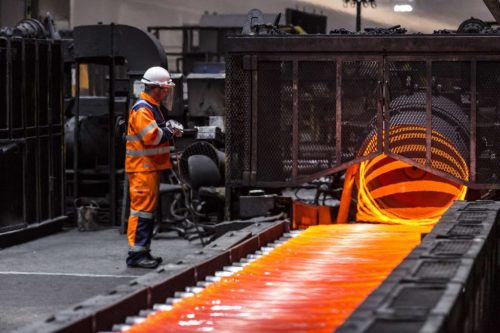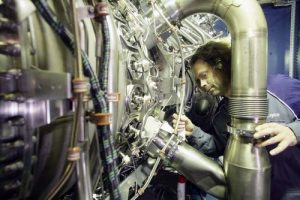Threatened British Steel closure puts up to 2,700 jobs at risk

British Steel is today launching a consultation which could lead to the closure of its two blast furnaces at Scunthorpe, threatening between 2,000 and 2,700 jobs.
The business warns the blast furnaces are “no longer financially sustainable” due to difficult market conditions, imposition of tariffs and higher environmental costs.
British Steel chief executive, Zengwei An, said: “We understand this is an extremely difficult day for our staff, their families, and everyone associated with British Steel.
“But we believe this is a necessary decision given the hugely challenging circumstances the business faces.
“We remain committed to engaging with our workforce and unions, as well as our suppliers and customers during this time.”
British Steel has been owned by Chinese firm Jingye since 2020 and the Scunthorpe site employs 3,500 people.
The business has been in discussions with the government for support for a major capital investment in two new Electric Arc Furnaces (EAF), but no deal has been agreed.
Jingye says that since 2020 it has invested more than £1.2bn to maintain operations amid ongoing production instability and significant financial losses of around £700,000 a day.
Union bosses have strongly condemned the potential closure. Steel unions Community, GMB and Unite say they want the government to do everything possible to secure the future of steelmaking in Scunthorpe.
Community general secretary, Roy Rickhuss, said: “This is a dark day for our steel industry and for our country. We urge Jingye and the UK Government to get back around the table to resume negotiations before it is too late.
“Cruciallly, Jingye have not ruled out retaining the blast furnaces during a transition to low carbon steelmaking if they can secure the backing of the Government.
“The closures at Scunthorpe would represent a hammer blow to communities which were built on steel, and where the industry still supports thousands of jobs directly and thousands more through extensive supply chains.
“Given that we are now on the cusp of becoming the only G7 country without domestic primary steelmaking capacity, it is no exaggeration to say that our national security is gravely threatened.
“This would be catastrophic at any time, let alone in the current era of geopolitical instability and volatility. Steel is an essential component of defensive infrastructure, just as it is to wider plans to invest in growth across the country.
“If the government chooses to let Scunthorpe die it would make a mockery of their grand ambitions to deliver growth through massive infrastructure investment, because British Steel is our only steelmaker than can produce the construction steels the country needs for our roads, railways, schools and hospitals.”
British Steel has said it will “continue to work with the UK government to explore options for the future of the business.”
The company said it would begin a formal consultation with its workers and unions over three options:
One is the closure of the blast furnaces, steelmaking operations and Scunthorpe Rod Mill by early June 2025.
The second is the closure of the blast furnaces and steelmaking operations in September 2025.
The third is a closure of the blast furnaces and steelmaking operations at a future point beyond September 2025.
Business and trade secretary Jonathan Reynolds said: “I know this will be a deeply worrying time for staff and, while this is British Steel’s decision, we will continue working tirelessly to reach an agreement with the company’s owners to secure its future and protect taxpayers’ money.
“We’ve been clear there’s a bright future for steelmaking in the UK. We’ve committed up to £2.5bn to rebuild the sector and will soon publish a Plan for Steel setting out how we can achieve a sustainable future for the workforce, industry and local communities.”








